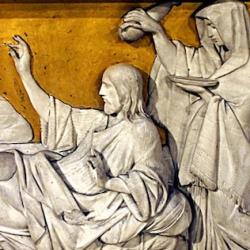The current issue of Semeia (#45) is devoted to “New Testament Masculinities,” and is a contribution to the growing academic study of masculinity. Jerome Neyrey has an interesting article here on Jesus’ masculinity in the gospel of Matthew. Two of his conclusions are particularly noteworthy:
1) “Matthew rarely locates [Jesus] ‘inside’ and mentions no duties that he has toward his household, either to mother, wife, or children. He appears in the ‘private’ world of nonrelated males and females (e.g., in marketplaces, synagogues, dining rooms or traveling to wilderness, mountains, temple, and the like). Moreover, Matthew credits Jesus with an exalted role and status that belong to persons in the public-political world.” Through an analysis of Jesus’ rhetoric and titles, Neyrey concludes that Jesus is located primarily in the male public world of politics and combat. He “has voice” among the leading men of his day, and performs well in the exclusively male combat of statement and riposte. In short, the gender symbolism of Matthew underwrites the fact that Jesus proclaims a public and political gospel, a gospel of the “kingdom.”
2) At the same time, Jesus radically challenges the leading male value of the ancient world ?Ehonor. He speaks of honor throughout the sermon on the mount, and “call[s] off the typical games whereby males pursued honor and physical, sexual, and verbal aggression . . . , and he demanded that his disciples on select occasions vacate the playing field where honor is claimed and awarded.” Thus “Jesus discredits conventional honor-gaining and honor-maintaining behavior. In this regard he challenges much of the prevailing male gender stereotype.” During Jesus’ journey toward Jerusalem, Neyrey finds Jesus teaching “a new code of honor and shame,” one in which honor comes from taking up the cross and shame from lack of faith; honor comes from being like a child, while discipleship might require the shameful loss of a limb; honor comes from forgiveness of wrongs rather than engeance; honor comes from loss of wealth and power, and from renunciation of sexual aggression.
In short, Jesus is for Matthew the perfect public male figure, but at the same time a figure that radically undercuts the basis for ancient conceptions of masculinity.















